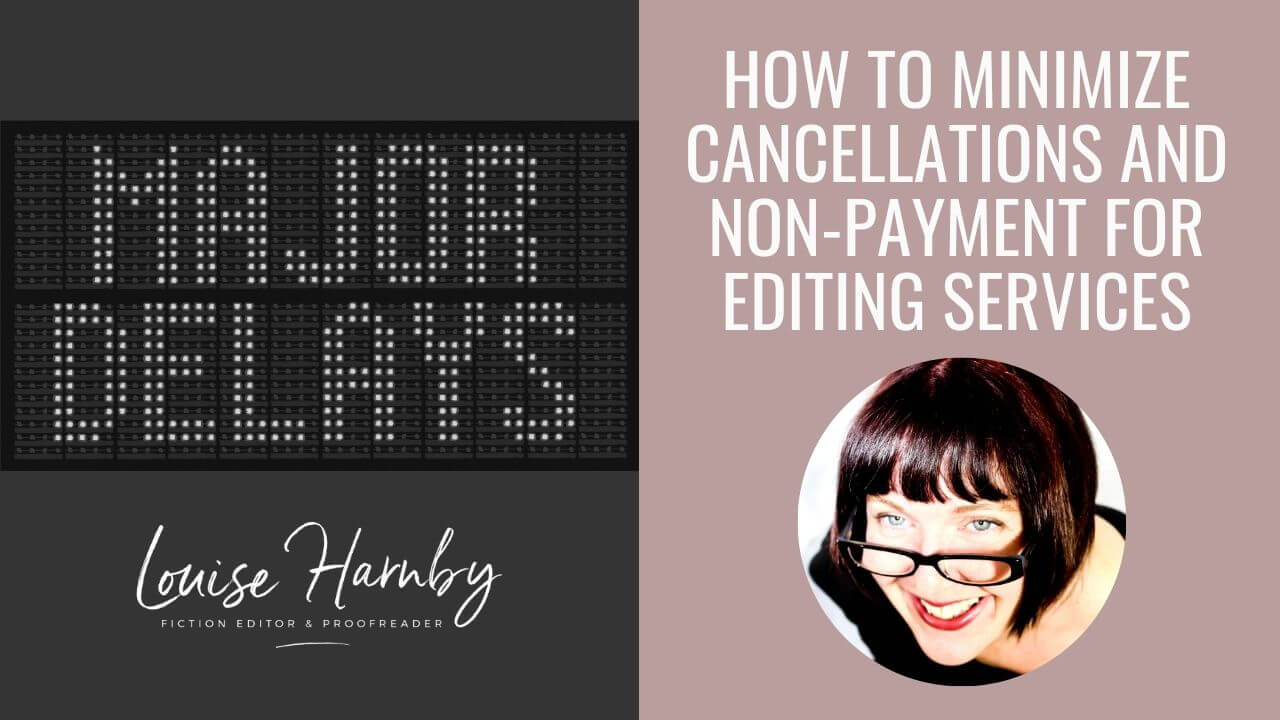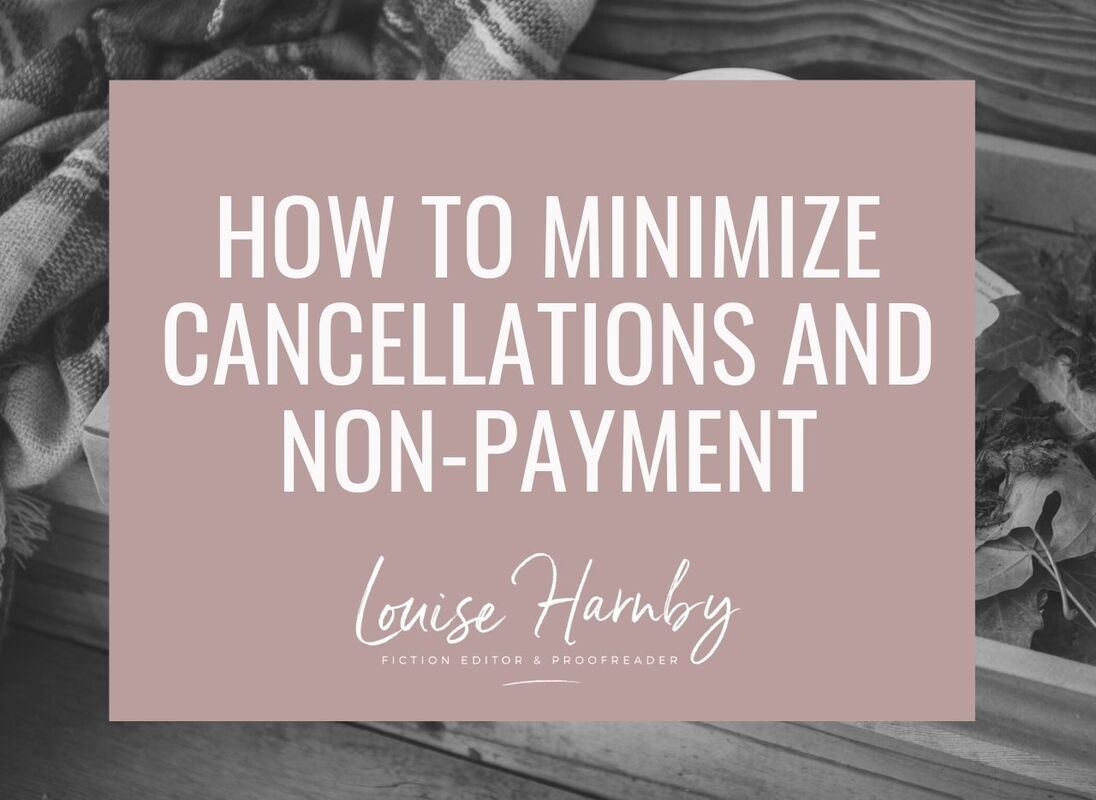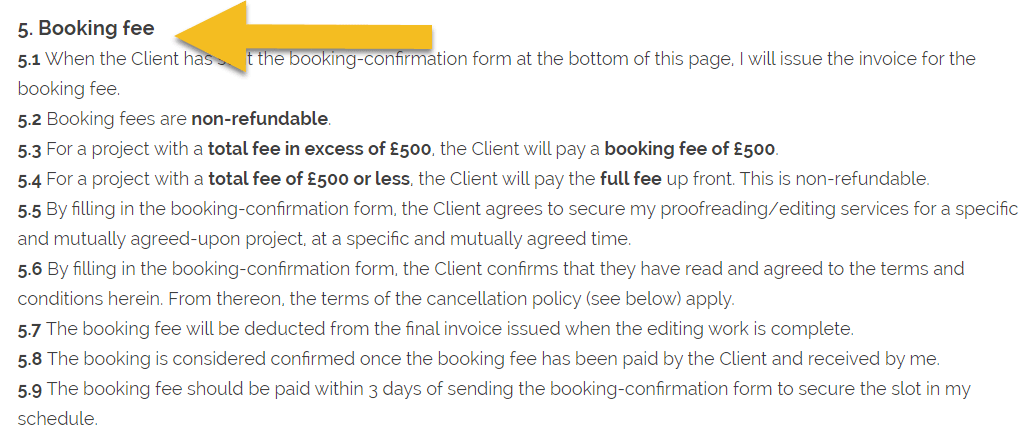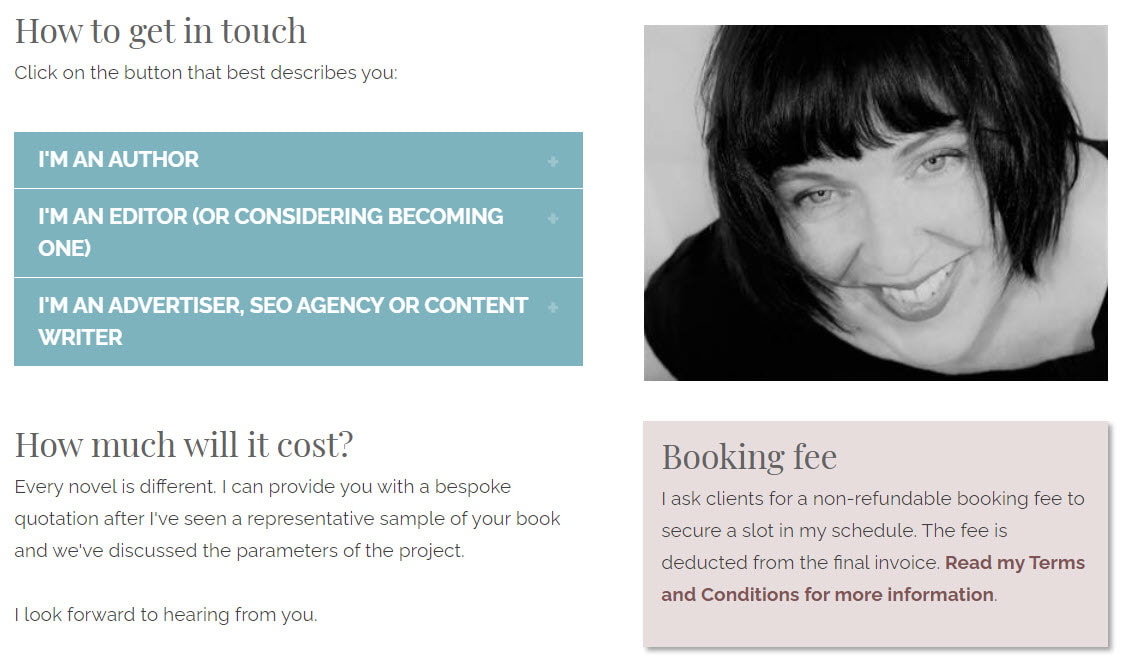|
Every professional editor and proofreader wants to attract best-fit clients who are prepared to commit to a contract of editorial services. For the most part, bookings go smoothly – cancellations, delays, and failures to pay are unusual. Still, editorial business owners need to protect themselves ... just in case.
This article doesn’t seek to offer you a model contract or set of terms and conditions (T&Cs), though you’re welcome to look at mine for inspiration: Terms and conditions.
Instead, I want to explore some ideas about how to develop your spidey sense, and use language and tools that will repel those who’d let you down. What does ‘delay’ mean to you? The concept of the delay is nonsense to an editorial business owner. If a client asks you to proofread a book, tells you the proofs will arrive with you on 10 May, and requests return of the marked-up proofs a week later, and you agree to take on the job, those are the terms: proofread to start 10 May; delivery 7 days later. You’ll schedule the project accordingly, and will decline to work for anyone else from 10–17 May. If two weeks ahead of the start date you’re told ‘there’ll be a delay’, you’ll likely have no work for 10–17 May unless you can fill that space at the last minute. Moreover, you will be booked for another project during the period when the project will become available. To my mind, that’s not a delay. You can’t magic additional hours out of thin air. That’s a cancellation of the project terms that were agreed to by both parties.
Make sure your T&Cs reflect this. Don’t use the language of delay if it means nothing to you. Have a cancellation policy and make it clear that confirmed bookings are for an agreed time frame, and that failure to meet the agreed date will invoke that cancellation policy.
You might decide not to invoke it as a courtesy, but having it could reduce the likelihood of having to make the decision. Is ‘deposit’ a strong enough term? The word ‘deposit’ should be strong enough as long as the refund terms are clear. Still, you might want to couch your language along the lines of what editor and book coach Lisa Poisso calls ‘real money’. I don’t refer to deposits in my terms and conditions. I call them booking fees. A fee is a payment. It’s the language of money. ‘Deposit’ as a noun has a broader mass-of-material meaning; as a verb it means to place something somewhere. Maybe, for some people, it has a softer feel to it.
Of course, anyone required to pay a deposit knows full well that the financial definition is being referred to. Nevertheless, using the language of money – a fee – might well encourage time-wasters to think twice.
The following might also work for you:
What you charge upfront is up to you. Some editors charge a 50% booking fee rather than a flat rate. Some require one third to secure the booking, another third just before editing starts, and the remaining third upon completion of the project. You can define your own model. Do you have a booking form? You and a client can agree to your providing editorial services via email, and emails count contractually. But how about requiring a specific additional action, one that reinforces a sense of commitment? Asking someone to fill in a booking form that confirms they have read, understood and agreed to your terms and conditions, including your booking fee and your cancellation policy, means they have to make a proactive decision to commit. When it comes to filling in a form and ticking boxes, a non-committed client is less likely to feel comfortable than a good-fit one because it feels more formal. You can create a PDF booking form that you’ll email manually, or create the form on your website. My choice is the latter. I include it below my T&Cs. That way, the booking and the terms are closely linked. Here’s a screenshot of mine. Notice the boxes that must be checked in order to confirm the booking.
Is ‘booking form’ a strong enough term?
Even if someone is prepared to fill in a form and check some boxes, agreeing to a contract might make them think twice. That has a more legally binding feel about it; it’s more formal. And it might be the thing that repels someone who’s going to let you down. My T&Cs state that the booking-confirmation form is an agreement to the contract of services between me and the client, and the phrase ‘Contract of services agreement’ in the heading is what appears when they click on the booking-confirmation form button.
Are your terms and conditions detailed enough?
In the main, your website should be client-focused. It should make the client feel that you understand their problems, are able to deliver solutions, and understand what the impact of your solutions will be. Your brand voice should sing out loud. In my case, for example, that means using a gentle, nurturing tone. However, when it comes to your terms and conditions, forget all the touchy-feely stuff – this is where you and the client get down to business. It’s in everyone’s interests to know what’s what. That might mean that your T&Cs are rather dull and boring. No matter. It’s the one place on your website where you’re allowed to be dull and boring! I feel like chewing my own arm off when I read my T&Cs but I don’t want any of my clients in doubt about what I’m offering and what they’re getting. Think about the following:
A non-committed client will be repelled if your terms put them at risk. A good-fit client will feel reassured that they’re dealing with a fellow professional who takes the editing work as seriously as they do. Are the basics front and centre? Many editors place links to the detailed contractual stuff in their website’s footer, which means the T&Cs are almost invisible. Even a good-fit client probably won’t see or read your T&Cs during their initial search for editorial services. That’s the case on my website. If it’s the same for you, consider placing the basics front and centre. I’ve created a box on my contact page that spells out the non-refundable booking fee I charge.
Will it put off some potential clients? Absolutely. But if someone can’t afford that booking fee or doesn’t dare take the risk of making a payment because they’re unsure whether they’ll honour the contract, they’re not the right client for me.
Spotting red flags Developing your spidey sense can reduce the likelihood of becoming entangled with those who’ll back out of confirmed bookings or fail to pay.
Though there’s no foolproof way to protect yourself from non-committed clients, there are red flags you can look out for:
Summing up I hope these tips help you avoid non-committed clients and safeguard your business. Even if you implement some of my ideas, there are no guarantees unless you ask for 100% of your fee upfront. However, rest assured that most clients are honest, committed and trustworthy individuals who are a pleasure to work with. As for those who blow you out, a few are scoundrels. Others aren’t but are thoughtless and haven’t taken the time to understand the emotional and financial impact of cancellations and non-payment. Others have got cold feet. And some have been struck by unusual or extraordinary circumstances like bereavement. Most don’t mean to cause distress or place editors in financial hardship, even though those are two very real potential outcomes. By using real-money language and action-driving tools, we can build stronger bonds of trust with those who are serious about working with us, and repel most of those who aren’t. More resources
Louise Harnby is a line editor, copyeditor and proofreader who specializes in working with crime, mystery, suspense and thriller writers.
She is an Advanced Professional Member of the Chartered Institute of Editing and Proofreading (CIEP), a member of ACES, a Partner Member of The Alliance of Independent Authors (ALLi), and co-hosts The Editing Podcast.
12 Comments
Louise Harnby
6/9/2018 09:52:29 am
Thanks so much, Linda!
Reply
6/9/2018 11:15:18 pm
Penalties are advisable. I have been kept waiting for a very long time by one customer for payment for a full book edit. Also, on the longer projects, progress payments are a good idea I wish I'd introduced before. Otherwise you edit three quarters of a novel, and then wait for inspiration to strike the writer sufficiently for it to be completed.
Reply
Louise Harnby
7/9/2018 08:28:21 pm
Another really good idea. Thank you!
Reply
CeCe
2/11/2018 04:46:07 am
I like the idea of a booking fee for new clients. If I may be so bold as to ask, how did you come up with that fee?
Reply
Louise Harnby
2/11/2018 11:02:17 am
No maths behind it CeCe! I had a think about what would work - something chunky enough to make a client think seriously about the consequences of cancelling, but low enough not to be off-putting prior to any work having been done. I know some editors charge 50% up front. My current fee isn't set in stone. I might change it if it stops doing its job, but for me it works at the moment. I think every editor has to decide what works for them.
Reply
CeCe
27/2/2019 05:07:59 am
Hi Louise, can you talk about YOUR process when onboarding a new client? What happens after they fill out the form on the Contact page? I'm curious at what stage in the process the client fills out that booking form. If you talk about that on the blog somewhere, please let me know.
Reply
Louise Harnby
27/2/2019 12:40:00 pm
Of course, CeCe! I'll write a blog post for you in the next couple of days that outlines my process.
Reply
Louise Harnby
27/2/2019 10:41:03 pm
CeCe, it's here: https://www.louiseharnbyproofreader.com/blog/the-author-editor-relationship-from-getting-in-touch-to-making-a-booking
Crystal
11/6/2019 05:47:58 am
I am just starting my freelance editing business and stumbled across your page. I'm blown away by the amount of resources you've provided editors, so thank you for sharing your wealth of knowledge!
Reply
Louise Harnby
11/6/2019 02:12:31 pm
I didn't use a lawyer but I followed the basic structure of the SfEP's template https://www.sfep.org.uk/standards/contracts/model-terms-and-conditions, then tweaked massively to make sure it fitted my needs!
Reply
Crystal
12/6/2019 03:32:08 am
Thank you for the link! Leave a Reply. |
BLOG ALERTSIf you'd like me to email you when a new blog post is available, sign up for blog alerts!
TESTIMONIALSDare Rogers'Louise uses her expertise to hone a story until it's razor sharp, while still allowing the author’s voice to remain dominant.'Jeff Carson'I wholeheartedly recommend her services ... Just don’t hire her when I need her.'J B Turner'Sincere thanks for a beautiful and elegant piece of work. First class.'Ayshe Gemedzhy'What makes her stand out and shine is her ability to immerse herself in your story.'Salt Publishing'A million thanks – your mark-up is perfect, as always.'CATEGORIES
All
ARCHIVES
July 2024
|
|
|
|
























 RSS Feed
RSS Feed





